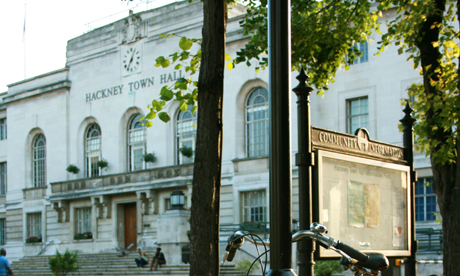Letter: Deputy Mayor disputes cost saving of dumping green energy

Hackney Town Hall. Photograph: Hackney Citizen
In response to the article in Hackney Citizen (October) regarding Hackney Council’s position on sustainability – I write to point out an error that would have misled readers.
When the council switched its energy supplier the saving was £46,000 not the £7,000 stated. Instead of accusing me of being misleading in your headline I would have hoped that at least the facts were correctly reported.
Hackney is one of the greenest London boroughs for carbon emissions and the most recent National Indicator data puts us joint second in London in terms of per capita emissions at 3.8 tonnes per head with only Redbridge lower at 3.6 tonnes.
Rising living standards across the borough and more wealthy residents moving here are creating real challenges in terms of reducing energy consumption.
There are also other factors such as the regeneration of our housing estates and the development of new housing, commercial and business premises as well as our role as a host borough for London 2012 – all of which make demands on energy use.
We acknowledge that domestic carbon emissions present a particular challenge. We are working with Hackney Homes to improve our own housing stock through the Decent Homes programme. We are also working with London Warm Zone to reach out to homes in the private sector.
We commission an award-winning energy advice service available to all residents which provides advice on how to reduce energy consumption and fuel bills, and a range of other green subjects including how to generate renewable energy at home.
Councillor Sophie Linden
Deputy Mayor, Hackney Council
Editor’s response:
The Hackney Citizen calculated the £7,000 figure thus: through a Freedom of Information request made by the Citizen in August 2009, we learnt that of the £46,000 that the council saved by leaving the ‘green’ tariff, around £34,000 was spent on energy-savings measures, which in turn saved the council £73,515.
This left a ‘green credit’ of £39,515, which nearly covered the extra cost of the green tariff – we argued that for around £7,000 more the council could have retained the tariff.
Readers may remember that the council ran a front page story in its freesheet Hackney Today on 18 June 2007 when it switched to ‘green’ energy: “Everything’s gone green in Hackney,” trumpeted a front page splash. However, just a year later the Town Hall quietly reverted to buying ‘brown’ energy.
The Hackney Citizen quizzed the council about when exactly it dumped the ‘green’ tariff.
A council spokesperson said it officially reverted to brown energy in April 2008, explaining that the driver for this was the energy supplier increasing its premium for hydro generated electricity by 1000% in one year.
Asked by the Citizen what efforts the council had made to inform Hackney residents that it left the green tariff and the reasons why it had done so, the spokesperson explained that the details were made publicly available online in the papers for the council’s Cabinet Procurement Committee, 21 October 2008.
But it all went curiously unmentioned in Hackney Today, the council’s award-winning ‘newspaper’.

Either you have explained things poorly or your mathematics is faulty.
The only way your £7000 figure would be true would be if the so called ‘green credit’ could only be achieved if the council adopted the green tariff. In fact you imply the opposite is true – that the ‘green credit’ saving could only be achieved by the council dropping the green tariff.
If this is the case then dropping the green tariff actually saved the council the initial £46,000 plus the £39,515 ‘green credit’ (a total of £85,515).
Even if the council was able to find the money for the ‘green credit’ saving while keeping the green tariff, it would still be £46,000 more expensive than dropping the tariff as the ‘green credit’ could be achieved (and you seem to indicate more easily) with the standard tariff.
@Ben Niceson:
You appear to be approaching this question exclusively from the point of view of maximum savings to the council.
The point made in our response was that, were Hackney Council willing to devote resources to environmental measures, they could have both remained on the ‘green’ tariff and undertaken energy efficiency measures for very little additional cost, as the net impact of this combined package would have been only £7,000 greater than undertaking no ‘green’ measures at all.
Hackney Council did adopt the ‘green’ tariff, as the story points out.
Our point was that the council appeared to claim that it ditched the ‘green’ tariff because it could no longer afford it, yet it is clear from its own actions that it could easily have been able to afford to remain on the tariff by making ‘green’ savings in other areas.
This ‘green’ initiative looks more expensive at first glance than conventional approaches, but the additional expense can be off-set by savings through energy efficiencies.
A different approach might have treated these schemes as a package, rather than evaluating costs for individual items separately – Ed.
There is nothing contradictory or dishonest about scrapping a scheme that costs money and then starting one that saves money.
The ‘package’ you speak of simply doesn’t exist as the elements are independent of each other. Pretending they are not does not help the environment or the people of Hackney.
The green tariff costs £46,000 – none of the green savings are dependent on it. If you think this would be money well spent then that’s fine but the £7000 figure you quote is simply misleading.
By your reasoning the council could roll any (potentially unpopular) money losing scheme into a ‘package’ with a profitable one and claim it was not costing any money.